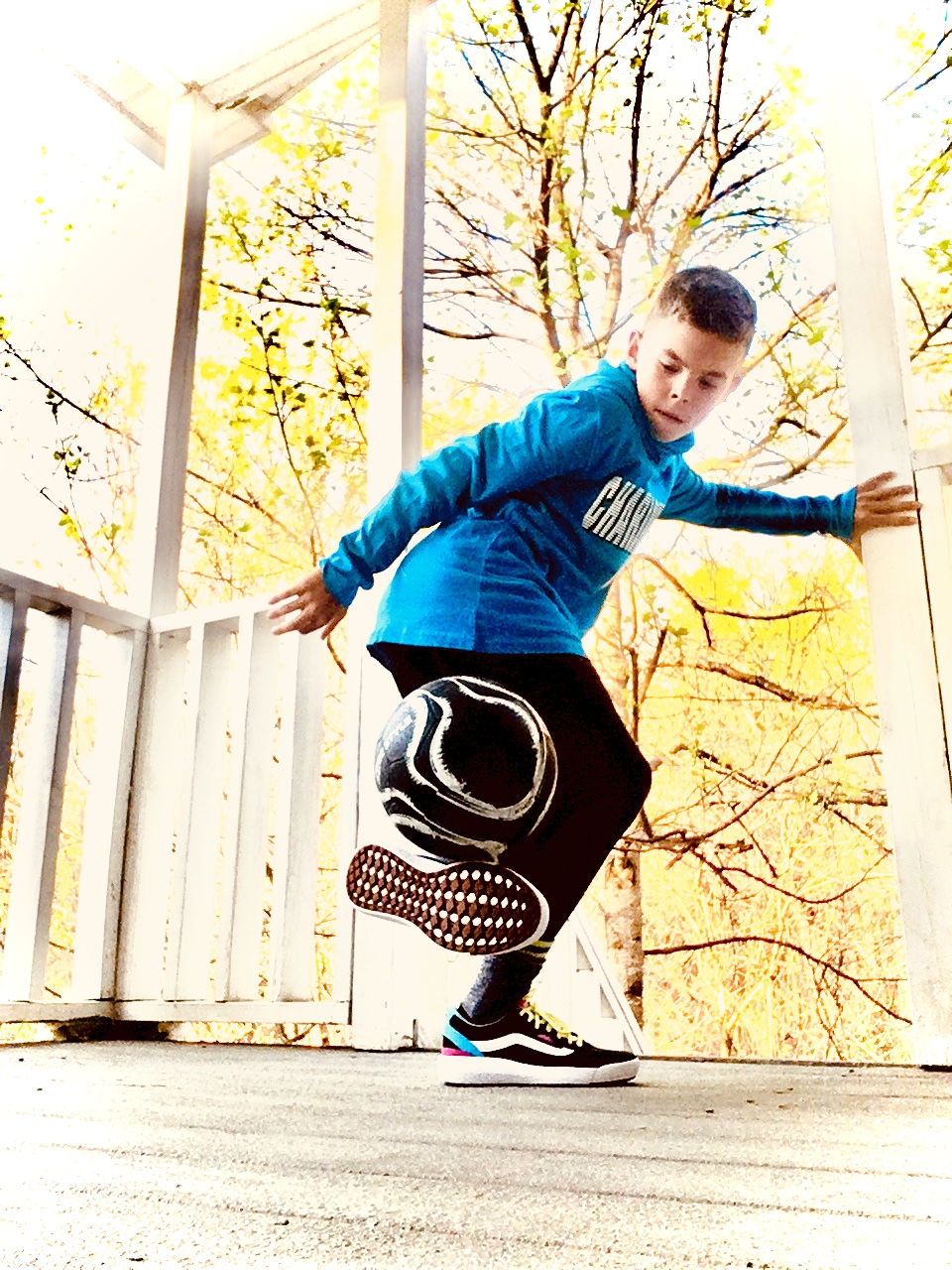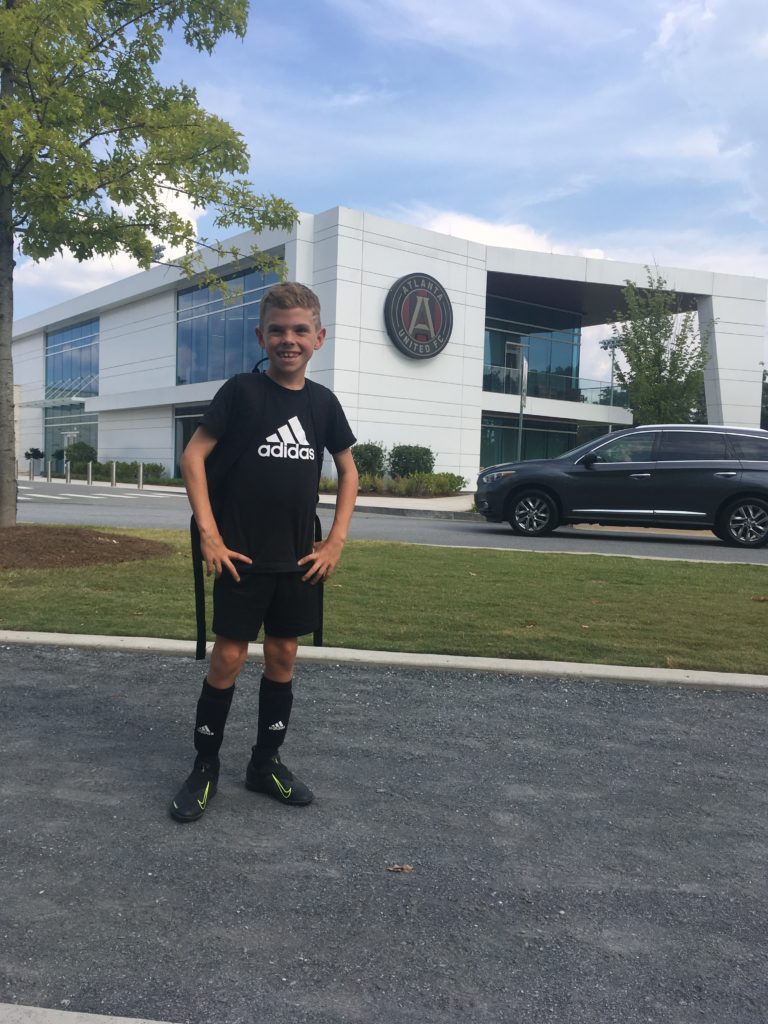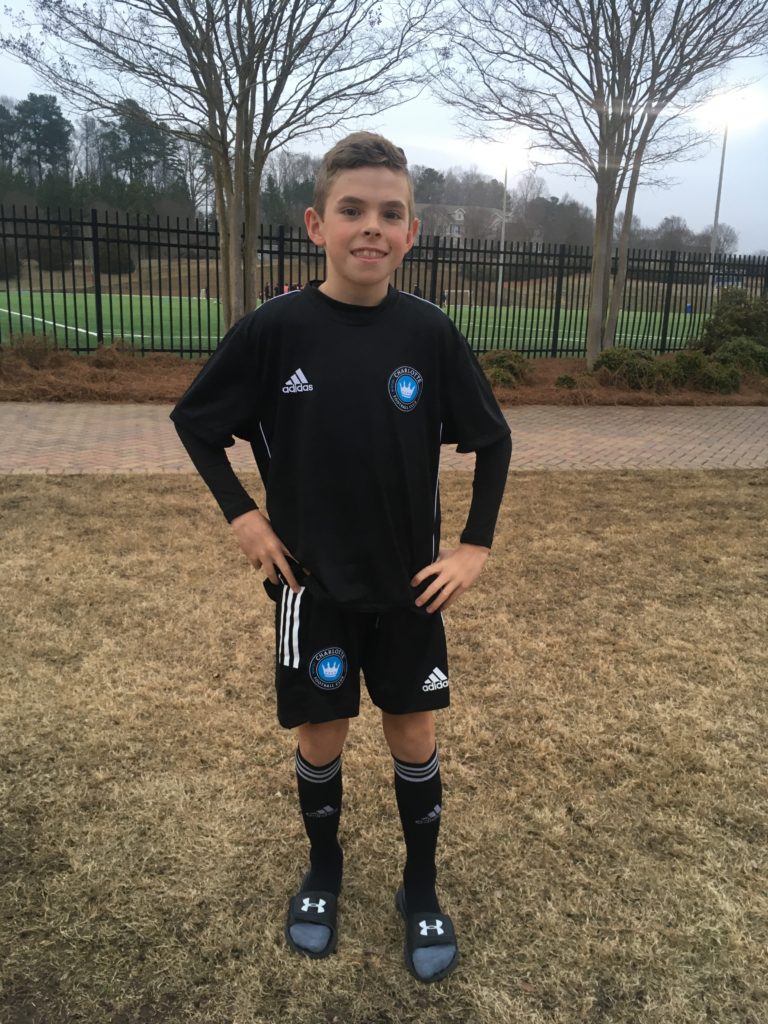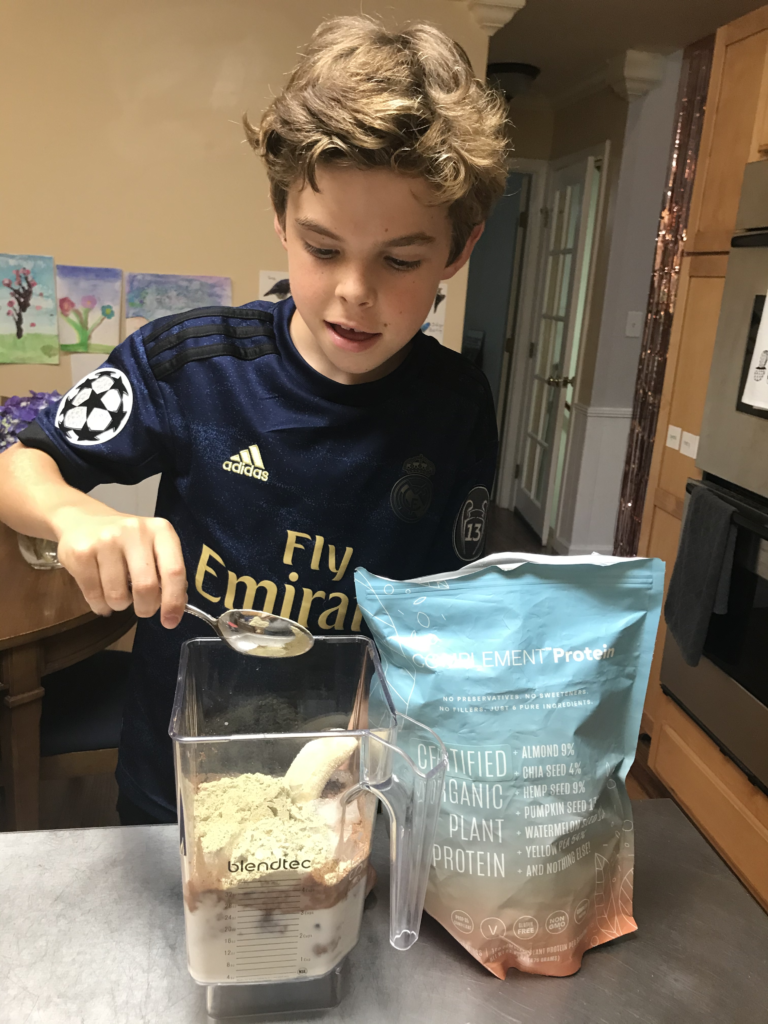
How I’ve Raised a Superstar Plant-Based Athlete
Eleven years ago, I wrote a blog post introducing Baby NMA to the world.
Well, to our world. Which back then encompassed about 500 readers of my year-old blog.
That baby — my son, Holden — isn’t a baby anymore. But he’s more a No Meat Athlete than ever — he’s been vegan since age 2, and vegetarian before that, and he’s a better athlete than either my wife or I ever was.
We’ve known for years that Holden is a special athlete, but I was hesitant to write about him here for a few reasons, mostly just privacy and his young age.
But given his soccer accomplishments, I’d put him in the “serious athlete” category, and now that his own online presence has grown (follow him on Instagram at @mountainfootballkid), I figured it was the appropriate time to share a little bit.
When Holden was 9, he was invited to be a part of MLS (Major League Soccer) club Atlanta United’s Juniors program, a group so selective that we decided it worthwhile to drive there on Friday nights (three and half hours each way!) for him to train.

Then last year it was announced that the MLS would be expanding to Charlotte, North Carolina, so Holden now plays in Charlotte FC’s Discovery Program — their pre-Academy program, where he trains with a small group of about 20 top players from around North and South Carolina, most of them a year older than he is.

In fact, our family recently decided to move to Charlotte (from Asheville, NC), largely to support Holden’s soccer development. (And to support our sanity — the drive from Asheville to his club in Greenville, SC had started to really wear on us.)
While we didn’t move here solely for the Charlotte FC opportunity — since at this young age, things change very quickly as players develop at different rates — it certainly added to the appeal of being in a larger city, along with many other soccer opportunities here that he didn’t have in Asheville. (Our eight-year-old daughter is also a very talented athlete too, so we’re also thinking of her future with this move as well.)
To give you a sense of the type of player Holden is, here are a couple of videos of his highlights and training (almost all of this footage is a year or two old, but you’ll get the idea):
And here’s my favorite goal of his (though nowadays he’s more a midfielder than a goal-scorer):
Of course I realize that all of this has only a small amount to do with my approach to raising an athlete, and so much to do with the type of kid Holden is — dedicated, focused, and certainly, athletic. But I do think that our approach to parenting — and how we’ve navigated this unknown (to us) territory of high-level youth sports — has had at least something do with his success so far.
So I want to share the ingredients that have gone into the making of a great young athlete… who happens to eat a plant-based diet.
How to Raise a Great Young Athlete (and Person)
1. Encourage a growth mindset.
When I was growing up and, like seemingly every other kid, wanted to be a pro athlete, nobody was talking about the 10,000-hour rule. You either had it or you didn’t; some people were lucky to be gifted and some people just weren’t.
But this attitude too easily lets one off the hook. If you’re not responsible for your development (and instead, you can just blame a lack of inborn talent), then it’s easier to quit than to keep going, and to feel just fine about it.
The research presented in books like Talent is Overrated, Outliers, and Mindset has changed this belief, for me. And what a liberating idea! The best in the world get there because they’ve put in the most work (10,000 hours or more, according to Malcolm Gladwell).
And even if you’re not trying to be the best in the world, a mindset that says “I can change” is infinitely more powerful than one that says “I am what I am, and I’m stuck with it.”
So for as long as my kids could understand it, I’ve been giving them this message, first and foremost.
When things go well, we point back to all the work that went into making them go so well. When they don’t, we talk about taking responsibility for our outcomes, and how so often, hard work is the remedy for a bad one.
(I also like to believe that even before my kids could understand the growth mindset, they’ve observed it in the way I pursue hobbies, like learning languages, playing musical instruments, and recently, kettlebell training.)
2. Learn with them, and help them love the work.
I played soccer through middle school age, but never beyond that. My wife and I had essentially zero soccer skills or knowledge when Holden told us, at age 7, that he wanted to try soccer.
But I wanted to be supportive, so Holden and I started kicking the ball in the yard. We set a goal of doing it every day, and it soon became to be the most relaxing 30-45 minutes of my day.
Then we started juggling the ball together. Juggling is where you use your feet (and your thighs, and anything else you want except for your arms and hands) to keep the ball from hitting the ground. I never learned to do it as a kid.
One thing I noticed, when coaches started recommending that kids learn to juggle the ball to develop their touch, is that most parents don’t help their kids with it. They tell their kids to go outside and practice juggling, but if you’ve ever tried to learn how to juggle a ball, you know it’s a painful process at first: You spend far more time chasing the ball than actually juggling it. To expect a kid to stick with this on his or her own is borderline unreasonable.
So from the beginning, Holden and I partner-juggled together. We did it in a little patio that my dad helped me convert into a turfed soccer room with a rebounder net, which helped with the rolling-away problem, and also turned out to be a great practice space because it forced Holden to develop the footwork to maneuver in and out of tight spaces.
We spent hundreds of hours in that room, sometimes three or four hours in a day. And it’s no exaggeration to say some of our very best memories — of laughing, working, listening to music, chasing a goal, and celebrating together — were made in that room.
And as a result, Holden learned to juggle faster than any kid I’ve ever seen.
When he was still 8, he could juggle the ball 100 times.
And before he turned 10, he juggled 1,200 times (before finally stopping when he got bored!):
And now his touch on the ball and his footwork are two of his greatest strengths as a player.
Oh, and I learned to juggle, too. Which is a nice party trick, and a reminder of all the fun we’ve had and the work we put in.
3. Find a Yoda (who probably isn’t you).
Like I said, I knew nothing about soccer, and neither did my wife. So we found a coach.
I’ll admit we got lucky in this department. Holden’s very first private coach, Anthony Brenner, has been exactly the coach he needed. (And he also eats a plant-based diet!)
Most importantly, Anthony never taught Holden the skills that I (as a know-nothing soccer parent) wanted him to teach him — aggression, shooting, and all the things that I thought would help him score more goals on the weekends.
Instead, Anthony insisted on the fundamentals. Technique. Minute details (with lots and lots repetition) that didn’t make a visible difference in Holden’s play for many months… until they did, seemingly all at once.
That, along with meditation, soccer intelligence through film review, functional strength training, and a whole lot more. (Check out The Inner Game of Tennis to get a sense of a mindfulness-based, rather than instruction-based, approach to coaching.)
I know there aren’t many Anthonys out there; like I said, we lucked out. But the point is that my wife and I realized we couldn’t teach Holden what he needed to learn, so we found someone who could.
4. Let their desire (not yours) be the driver.
Several times when I’ve told coaches about how hard Holden works, and how much time we were spending in the car (like the Atlanta drive), they’ve warned me about burnout. And rightly so.
It’s still a risk, I get that. But my philosophy here is that if Holden wants to pursue an opportunity — say, soccer camp in Spain, or that weekly drive to Atlanta a few years ago — I try my hardest to make it happen.
What I don’t do is ever push him into an opportunity that he’s not excited about. In fact, I usually do the opposite: when he’s really excited about a big new commitment, I remind him how hard it will be on us, and on him… about the sacrifice that comes with it. I make him double- and triple-confirm that he wants to do it before we commit.
Now, if only desire could literally be the driver (like, of the car) then I’d have a lot more time.
5. No expectations.
When I wrote that blog post 11 years ago, I joked about how Holden might run the Boston Marathon as soon as he turns 18. (Still a very real possibility, because his endurance is incredible… very likely due, in my opinion, to his diet. See #6.)
But my friend Leo Babauta, from Zen Habits, gave me some of the best dad advice I’ve ever gotten when he told me not to have any expectations, and instead let Holden be whoever he is going to be.
So every now and then, I take a big step back and ask him if he still enjoys playing soccer — really enjoys it, like more than anything else, enough to be worth this tremendous effort we all put into it — and make sure he knows that even if he decided to quit today, that would be his decision and it would be okay. (Well, as long as he finished out the season first.)
Yes, we’d be disappointed to see it end so soon, but not disappointed in him… and I make sure he knows that our love for him has absolutely nothing to do with soccer.
Oh, and I’m careful never say “I’m proud of you” because of soccer. I tell him I’m proud of him for who he is — that it’s so much fun when he plays great and I love watching him play more than anything else… but my being proud doesn’t depend on it whatsoever.
I have so much fun being a soccer dad; it’s such a privilege to watch someone who is better at something than I’ve ever been at anything in my life.
And I try to make sure that’s as far as it goes: This is really fun, and I’ll enjoy the ride for as long as it lasts.
6. What about diet?
I’m glad you asked.
I believe that Holden’s plant-based diet (he’s 100 percent vegan) is a huge advantage for him. It’s not without challenges, because there are some, but overall, I have little doubt that the foods he eats help him much more than they hold him back.
Like a lot of vegans, grown-ups included, Holden drinks smoothies; eats salads, pasta, and stir-frys; loves tofu; and eats junk food now and then. (Despite never having eaten meat, he loves Impossible Whoppers and any fake meat that we’ll let him have.)
He recovers with tart cherry juice and Complement Protein-powered smoothies. Fuels workouts with Plant Bites. Gets ready for training with rice cakes and, recently, beet juice. And he takes Complement Core liquid nutrients and elderberry extract every morning.
The hardest part is simply making sure he eats enough. Total calories is what we focus on, not protein or any other nutrient. Whole, plant-based foods, which make up a lot of our family’s diet, are not very dense in calories — meaning they fill you up on relatively few calories, compared to animal-based foods. Great for weight loss, sometimes a challenge for athletes — particularly growing kids.
So my wife and I steer Holden towards calorie-dense foods. Hence the vegan weight-gainer shake we came up with for him, hence Complement Protein (which I developed because I didn’t trust other protein powders on the market for my kids), hence a whole lot of nuts, nut butters, LARABARs, etc.

That, and we try to make the meals we know he’ll eat a lot of. Usually they’re healthy. Sometimes they’re not, but they pack so many calories it’s hard to say no. It’s a tradeoff, and we’re still learning to find the right balance.
So that’s Holden, and the way we’ve tried to approach parenting an athlete who is more talented and a harder worker than we ever imagined possible. I never expected to enjoy putting so much time and energy into my kids’ sports, but like so many other surprises parenting has given to me, it’s been an incredible learning and growing experience — for me and my wife, just as much as for Holden.
We’re extremely grateful, and whatever the future may have in store, this has already all been worth it, for its own sake — for the fun it has given us and what it has taught all of us.
PS. Of course, there’s much more that goes into our philosophy around plant-based food for fitness, and my new book, The Plant-Based Athlete, is a manual for exactly that. Check it out here.
And by the way, when you pre-order The Plant-Based Athlete before next Wednesday, June 2nd, you get a free NMA Academy module — one of which is Plant-Based Nutrition for Kids, where my friend and plant-based PhD/RD Pamela Fergusson goes in-depth on this topic.
Leave a Reply
Great to hear that your son is doing so well on a plant based diet! However, I recommend you check on the Impossible Burger (GMOs). Article in this link:




I may have to rethink how I feel about soccer – absolutely amazing to watch! Kudos to wonderful parenting, also.